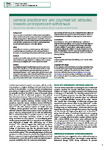General practitioners’ and psychiatrists’ attitudes towards antidepressant withdrawal
| dc.contributor.author | McCabe, J | |
| dc.contributor.author | Wilcock, M | |
| dc.contributor.author | Atkinson, K | |
| dc.contributor.author | Laugharne, Richard | |
| dc.contributor.author | Shankar, Rohit | |
| dc.date.accessioned | 2021-05-23T08:51:47Z | |
| dc.date.available | 2021-05-23T08:51:47Z | |
| dc.date.issued | 2020-07 | |
| dc.identifier.issn | 2056-4724 | |
| dc.identifier.issn | 2056-4724 | |
| dc.identifier.other | e64 | |
| dc.identifier.uri | http://hdl.handle.net/10026.1/17185 | |
| dc.description.abstract |
<jats:sec id="S2056472420000484_sec_a1" sec-type="other"> <jats:title>Background</jats:title> <jats:p>There has been a recent rise in antidepressant prescriptions. After the episode for which it was prescribed, the patient should ideally be supported in withdrawing the medication. There is increasing evidence for withdrawal symptoms (sometimes called discontinuation symptoms) occurring on ceasing treatment, sometimes having severe or prolonged effects.</jats:p> </jats:sec> <jats:sec id="S2056472420000484_sec_a2" sec-type="other"> <jats:title>Aims</jats:title> <jats:p>To identify and compare current knowledge, attitudes and practices of general practitioners (GPs) and psychiatrists in Cornwall, UK, concerning antidepressant withdrawal symptoms.</jats:p> </jats:sec> <jats:sec id="S2056472420000484_sec_a3" sec-type="methods"> <jats:title>Method</jats:title> <jats:p>Questions about withdrawal symptoms and management were asked of GPs and psychiatrists in a multiple-choice cross-sectional study co-designed with a lived experience expert.</jats:p> </jats:sec> <jats:sec id="S2056472420000484_sec_a4" sec-type="results"> <jats:title>Results</jats:title> <jats:p>Psychiatrists thought that withdrawal symptoms were more severe than GPs did (<jats:italic>P</jats:italic> = 0.003); 53% (22/42) of GPs and 69% (18/26) of psychiatrists thought that withdrawal symptoms typically last between 1 and 4 weeks, although there was a wide range of answers given; 35% (9/26) of psychiatrists but no GPs identified a pharmacist as someone they may use to help manage antidepressant withdrawal. About three-quarters of respondents claimed they usually or always informed patients of potential withdrawal symptoms when they started a patient on antidepressants, but patient surveys say only 1% are warned.</jats:p> </jats:sec> <jats:sec id="S2056472420000484_sec_a5" sec-type="conclusions"> <jats:title>Conclusions</jats:title> <jats:p>Psychiatrists and GPs need to effectively warn patients of potential withdrawal effects. Community pharmacists might be useful in supporting GP-managed antidepressant withdrawal. The wide variation in responses to most questions posed to participants reflects the variation in results of research on the topic. This highlights a need for more reproducible studies to be carried out on antidepressant withdrawal, which could inform future guidelines.</jats:p> </jats:sec> | |
| dc.format.extent | e64- | |
| dc.format.medium | Electronic | |
| dc.language | en | |
| dc.language.iso | eng | |
| dc.publisher | Royal College of Psychiatrists | |
| dc.rights | Attribution-NonCommercial-NoDerivatives 4.0 International | |
| dc.rights | Attribution-NonCommercial-NoDerivatives 4.0 International | |
| dc.rights | Attribution-NonCommercial-NoDerivatives 4.0 International | |
| dc.rights | Attribution-NonCommercial-NoDerivatives 4.0 International | |
| dc.rights.uri | http://creativecommons.org/licenses/by-nc-nd/4.0/ | |
| dc.rights.uri | http://creativecommons.org/licenses/by-nc-nd/4.0/ | |
| dc.rights.uri | http://creativecommons.org/licenses/by-nc-nd/4.0/ | |
| dc.rights.uri | http://creativecommons.org/licenses/by-nc-nd/4.0/ | |
| dc.subject | Antidepressants | |
| dc.subject | withdrawal side-effects | |
| dc.subject | public mental health | |
| dc.subject | public opinion | |
| dc.title | General practitioners’ and psychiatrists’ attitudes towards antidepressant withdrawal | |
| dc.type | journal-article | |
| dc.type | Journal Article | |
| plymouth.author-url | https://www.webofscience.com/api/gateway?GWVersion=2&SrcApp=PARTNER_APP&SrcAuth=LinksAMR&KeyUT=WOS:000542770700001&DestLinkType=FullRecord&DestApp=ALL_WOS&UsrCustomerID=11bb513d99f797142bcfeffcc58ea008 | |
| plymouth.issue | 4 | |
| plymouth.volume | 6 | |
| plymouth.publication-status | Published | |
| plymouth.journal | BJPsych Open | |
| dc.identifier.doi | 10.1192/bjo.2020.48 | |
| plymouth.organisational-group | /Plymouth | |
| plymouth.organisational-group | /Plymouth/Faculty of Health | |
| plymouth.organisational-group | /Plymouth/Users by role | |
| dc.publisher.place | England | |
| dc.identifier.eissn | 2056-4724 | |
| dc.rights.embargoperiod | Not known | |
| rioxxterms.versionofrecord | 10.1192/bjo.2020.48 | |
| rioxxterms.licenseref.uri | http://creativecommons.org/licenses/by-nc-nd/4.0/ | |
| rioxxterms.type | Journal Article/Review |



